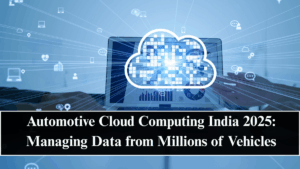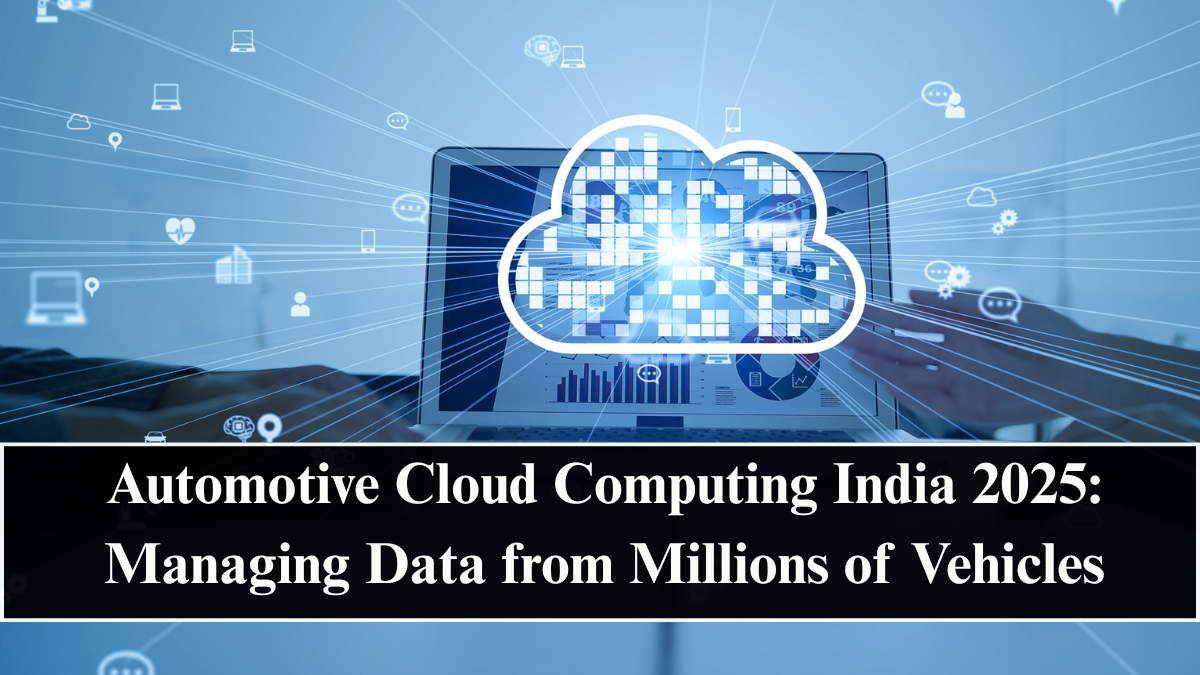As cars become more connected and intelligent, Automotive Cloud Computing India 2025 is transforming the way data flows through the mobility ecosystem. In today’s vehicles, nearly every component — from infotainment to safety systems — generates valuable data. The cloud now acts as the digital backbone that processes, stores, and analyses this data to enhance performance, efficiency, and user experience.
In 2025, India’s auto industry is at the center of a massive digital transformation powered by 5G networks, AI-driven analytics, and scalable cloud infrastructure. Millions of connected vehicles now exchange data in real time — shaping everything from predictive maintenance to smart city planning.

What Is Automotive Cloud Computing?
Automotive cloud computing is the integration of cloud-based platforms into vehicle systems and mobility services. It enables vehicles to:
-
Store and process data offboard in remote servers.
-
Receive over-the-air (OTA) software updates.
-
Use AI-based analytics for navigation, diagnostics, and personalization.
-
Connect with Vehicle-to-Everything (V2X) networks and IoT ecosystems.
This ensures vehicles are continuously updated, secure, and optimized — even after purchase.
The Rise of Cloud-Powered Mobility in India
India’s growing EV and connected car markets have made cloud infrastructure a necessity. Automakers like Tata Motors, Mahindra, Hyundai, and Maruti Suzuki are collaborating with cloud leaders such as AWS, Microsoft Azure, and Google Cloud to deploy scalable data platforms.
For instance, Tata Motors’ connected vehicle platform (CVP) leverages cloud computing to collect real-time data from over 500,000 vehicles, offering features like predictive maintenance alerts, location tracking, and driver behavior analytics.
Meanwhile, Bosch India and Continental are integrating hybrid cloud systems to enable advanced diagnostics and continuous performance monitoring for next-gen vehicles.
Key Benefits of Cloud Computing in the Automotive Sector
-
Real-Time Data Processing: Enables faster decision-making and response during navigation, accident detection, or system updates.
-
Scalable Data Storage: Handles petabytes of information from millions of connected cars efficiently.
-
Predictive Maintenance: Analyzes sensor data to forecast failures before they occur.
-
Enhanced Personalization: Creates tailored infotainment and comfort profiles for individual drivers.
-
Fleet Optimization: Helps ride-sharing and logistics companies manage routes and charging schedules dynamically.
Cloud computing is also crucial for electric vehicle ecosystems, connecting chargers, battery management systems, and mobility apps under one digital platform.
Data Security and Compliance
As connected vehicles rely heavily on cloud networks, data privacy and cybersecurity have become top priorities. The Automotive Cybersecurity Policy 2025 enforces encryption, multi-factor authentication, and compliance with international standards such as ISO/SAE 21434 and GDPR-equivalent norms.
Indian data centers are now hosting more automotive workloads locally to comply with the Data Protection Act, ensuring user information remains within national borders.
Cloud providers have introduced region-specific servers and AI threat detection systems to protect vehicles from remote hacking or unauthorized access.
AI, Edge, and Cloud Convergence
The next big leap lies in the synergy between edge computing and cloud intelligence. While edge systems process critical data within the vehicle (for low latency), the cloud aggregates and analyses it at scale for broader insights.
For instance:
-
Edge AI in the car detects immediate hazards.
-
Cloud AI aggregates fleet data to improve algorithms for future updates.
This closed feedback loop ensures that vehicles become smarter with every trip, enhancing autonomy and efficiency across the entire fleet network.
The Future of Cloud Mobility in India
By 2025, Automotive Cloud Computing has become integral to every connected mobility service — from self-driving car networks to predictive insurance and EV grid integration.
As India expands its 5G and satellite internet coverage, cloud-connected cars will enable:
-
Real-time traffic rerouting and weather-responsive navigation.
-
Integration with smart city infrastructure for automated tolling and traffic management.
-
Seamless software-as-a-service (SaaS) updates for vehicles via manufacturer platforms.
In the next decade, India’s mobility ecosystem will evolve into a data-driven, AI-enhanced cloud network — where every vehicle is both a transport mode and a data node.
FAQs
What is automotive cloud computing?
It’s the use of cloud platforms to process, analyze, and store data generated by connected vehicles for improved performance and services.
Which automakers in India use cloud platforms?
Tata Motors, Hyundai, Mahindra, and Maruti Suzuki use AWS, Azure, and Google Cloud for data analytics, telematics, and OTA updates.
How does cloud computing help EVs?
It connects EV batteries, chargers, and energy networks in real time to optimize range and charging efficiency.
What are the security measures for automotive cloud systems?
End-to-end encryption, local data storage compliance, and AI-based intrusion detection protect against cyber threats.
What’s next for automotive cloud computing in India?
Wider adoption of hybrid edge-cloud models will power autonomous driving, predictive analytics, and smart city vehicle integration.
Click here to know more.
